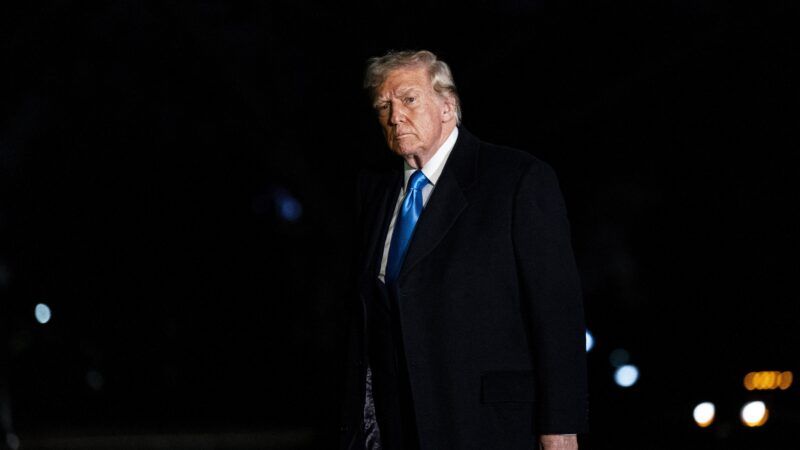Trump's North American Trade War Accomplished Nothing
Canada and Mexico agreed to keep doing things they were already doing, and Trump revealed that he cannot be trusted with unilateral tariff power.

Asked by reporters on Saturday afternoon if there was anything that Canada and Mexico could do to avoid the 25 percent tariffs the White House was threatening to impose on their exports to the United States, President Donald Trump delivered a clear response.
"Nothing."
That wasn't true, as it turns out. Those tariffs are now on hold—for 30 days, at least—after the leaders of Canada and Mexico reached deals with the Trump administration on Monday. In both cases, those "deals" include promises by both foreign governments to deploy more troops to their border and to have further discussions with the Trump administration about border security and curtailing drug smuggling.
In each case, it seems like the other countries have simply agreed to the status quo. Trump's deal with Mexico includes a promise from President Claudia Sheinbaum to deploy 10,000 troops to the border—even though Mexico already deployed nearly twice that number to the border in 2019. The deal with Canada similarly includes a promise of 10,000 troops and $1.3 billion in new border-security spending, which is exactly what the Canadian government said in December it planned to do.
Trump tore up the North American trade deal that he'd signed (and praised as the "best agreement we've ever made") just five years ago. He sent the stock market tumbling, forced the American automotive industry and other manufacturers to beg for mercy, and antagonized two of America's biggest trading partners and allies. And after all that, he got virtually nothing in return.
Indeed, Canada's and Mexico's governments may have gotten more. Their leaders learned that Trump sees 10,000 as a big and significant number and that they can appease his tariff fever by promising to just keep doing what they already do—as long as they make it sound like he's convinced them to change course.
"Trump did not extract anything new from Mexico with his threat of tariffs," writes Dominic Pino at National Review. "This episode does not illustrate that tariffs are good or that Trump is a fearsome negotiator. It illustrates that Trump is a cheap date."
It is telling that even ardent defenders of tariffs, and Trump's use them, were somewhat baffled by the whole thing. Oren Cass, the founder of American Compass and a leading figure within the nationalist conservative movement, in a post largely defending Trump's maneuvers, admitted that a key piece of the puzzle was missing.
"If the goal is to change behavior, the policymaker has an obligation to communicate demands clearly," Cass wrote, adding that Trump's demands of Canada were "unclear at best."
That's putting it kindly. Again, when Trump was asked directly by reporters on Saturday if there was anything Canada could do to avoid the tariffs, he said "nothing." In various social media posts, Trump claimed first that the tariffs were intended to stop fentanyl from coming across the border And then, a day later, said they were meant to compel Canada to join the United States. Vice President J.D. Vance tried his hand at putting some random meats on this tangle of bones Sunday night, writing on X that Canada wasn't keeping up with its NATO obligations.
(Those NATO obligations weren't even part of the deal that Trump and Trudeau struck on Monday, it's worth pointing out. Good try, J.D., better luck next time.)
Still, Cass argues that Trump was on the right track. "Think of a negotiating tariff like an embargo," adds Cass, "an economic tool of statecraft used to advance foreign policy aims. Evaluate it on that basis."
It is admittedly difficult, however, to evaluate these actions on that basis because the United States (like most nations) generally does not go around threatening to embargo its close allies and major trading partners. Indeed, that parallel is helpful in illustrating just how bizarre this whole incident was. Here's a comprehensive list of countries against which the U.S. has universal embargoes: Cuba, Iran, North Korea, Russia, and Syria. That's it. That's the whole list.
Cass would have you believe that it's perfectly acceptable for the president to treat Canada as if it belonged in that group—and to do so without congressional consent and without even clearly expressing why he felt Canada deserved such treatment or what the Canadian government could do to fix the situation. And that is the assessment of someone who is defending Trump's actions!
Any impartial measure of this whole incident must come down hard against Trump. The leaders of Mexico and Canada effectively called the president's bluff that there was nothing they could do to avoid tariffs. Facing the reality that tariffs would cause serious pain for American businesses—something that he even admitted last weekend (maybe he's learning?)—Trump retreated, leaving the United States–Mexico–Canada Agreement in tatters and the relationship between America and two of its key allies strained.
We should be glad that Trump safely found an off-ramp after steering the United States recklessly into a potentially ugly situation, and we can hope that he did not cause too much long-term damage while getting there.
But the most important lesson here is one Congress should have already learned: It's time to take away the keys—that is, rescind the president's unilateral power over trade. Next time, the result might be worse.


Show Comments (70)